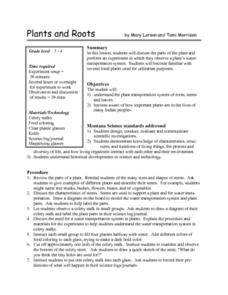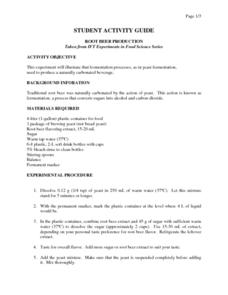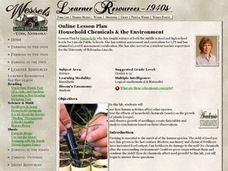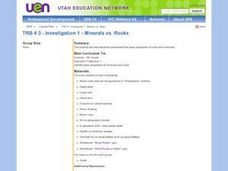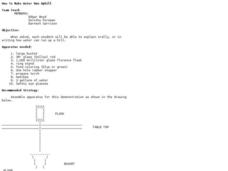Curated OER
Plants and Roots
Students discuss the parts of the plant and
perform an experiment in which they observe a plant's water
transportation system. They become familiar with
several local plants used for utilitarian purposes.
Curated OER
Biomes and Ecosystems
Students study biomes and ecosystems. They watch videos on rainforests and the food web and select a country of ancestry or interest to research. They write a report on the flora and fauna of their selected country. They present to...
Curated OER
Root Beer Production
In this fermentation worksheet, students conduct an experiment to illustrate how the yeast fermentation process is used to produce carbonation. This worksheet has 5 short answer questions.
Curated OER
How to Catch a Fish
Students conduct an experiment to demonstrate the effects of different fishing methods. In this commercial fishing lesson plan students create posters and public announcements to share their information.
Curated OER
Ocean Currents
Learners determine how water and wind affect ocean currents. In this science investigation lesson, students follow the provided steps to enable them to consider how explorers may have used ocean currents to their advantage.
Curated OER
Integrated Pest Management
Young scholars investigate the different methods used in integrated pest management. In this biology lesson, students evaluate experiments and case studies on IPM. They discuss the pros and cons of using this method.
Curated OER
Household Chemicals & the Environment
High schoolers conduct a laboratory experiment designed to investigate the effects of chemicals, soil quality and pollution on seed growth and plant yield. They consider how best to maximize agriculture in the long term.
Curated OER
Bird Beak Adaptation Lab
Middle schoolers investigate bird beaks to determine which physical adaptations are necessary based on the types of food the birds eat. They participate in a lab by visiting multiple stations to determine which beaks are most efficient,...
Curated OER
Minerals vs. Rocks
Fourth graders are introduced to the characteristics of a variety of minerals and rocks. As a class, they are shown rocks and minerals and asked to describe them as a geologist would. They work together to measure and record their...
Curated OER
Chemistry: Mini-Volcanoes
Students observe an experiment using common household chemicals to simulate a volcanic eruption. In small cups, they follow the teacher's instructions to make their own volcanoes. After watching a Brain-pop video, students complete...
Curated OER
Making Pretzels
Students discover that plants provide food products to humans. In this baking lesson, students grind wheat seeds into flour and then use the flour to make pretzels. Students participate in a variety of activities that involve them in...
Curated OER
How to Make Water Run Uphill
Young scholars observe science demonstration. In this science instructional activity, students watch an experiment showing water moving up from an area of higher concentration to an area of lower concentration, due to a change in...
Curated OER
Plant Roots
Students discover the purpose of plant roots and how they move water through a vascular system. They conduct an experiment using colored water to observe the movement of water through the roots and stem of a plant in a controlled...
Curated OER
Cling On's
Students define the term static electricity and how to it. In this electricity lesson students design and implement an experiment to show how static electricity affects their daily lives.
Curated OER
Taste (Gustation)
Young scholars conduct various experiments to see if different parts of the tongue are more sensitive to different characteristics of food.
Curated OER
A Fish in Water
Water is essential to all living things. This classroom experiment lets everyone observe goldfish and discuss what fish need to live, like food & clean water. They then listen to the book, Fish Out of Water, and compare the fictional...
Curated OER
Investigation 7 - Plants In Soil
Fourth graders explain how the components of soil effect plant growth. They brainstorm different kinds of materials that plants could use for structural support. They design an experiment to show that plants can grow without soil.
Alabama Learning Exchange
Why Roots, Stems, and Leaves are Important
Young scholars use the Internet to research the importance of leaves, stems and roots to plants. They participate in a hands-on experiment to identify the functions of different plant parts.
Curated OER
Taste Buds
Students sample several sweet, sour, bitter and salty foods. They determine what part of their tongue tasted each flavor.
Curated OER
Fresh Greens In The Home
Young scholars engage in the study of nutritional food choices that include fresh greens. They investigate the benefits of using simple planting techniques. The lesson also includes recipes for students to try out the habit of eating...
Curated OER
Constant Craving
Students experience the effect of sensory stimulation through a guided visualization. They explore possible genetic relationships between drug addiction and the nervous system by reading and discussing, "Genetic Studies Promise a Path to...
Curated OER
Recycling by Composting
Young scholars examine the idea of recycling by composting. Using the internet, they research the benefits of composting to the environment. In groups, they collect numbers on how much food and yard waste is produced in their...
Curated OER
Investigation Xylem
Students investigate how water travels up the stem of vascular plants by using food coloring to stain the xylem of a number of different plants. They know the function of leaves, stems, and root at the end of the experiment.
Curated OER
Ocean Currents
Students label the names, relative temperature, distribution, and direction of flow of major ocean currents on a world map. They also explore and model the natural forces that affect the movement of ocean currents through demonstrations...


